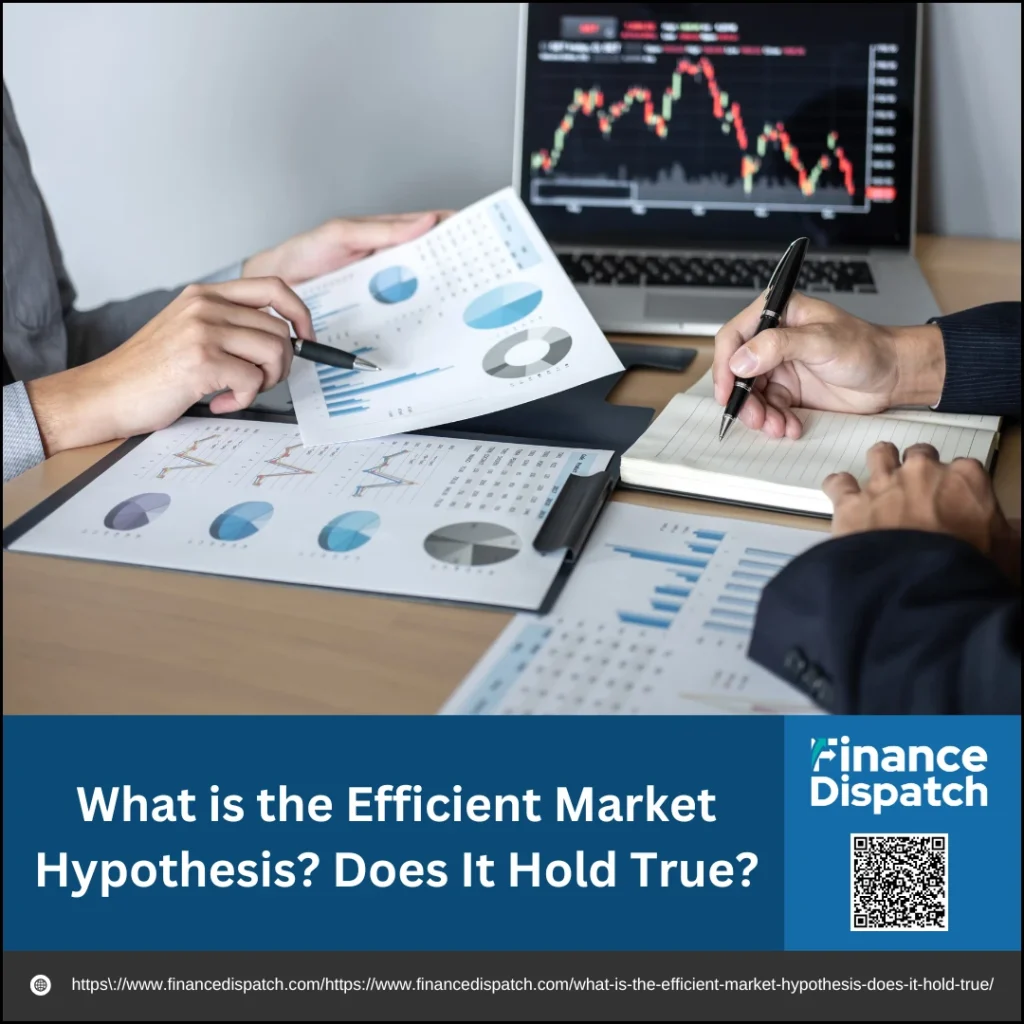The Efficient Market Hypothesis (EMH) is one of the most influential and debated theories in modern finance. At its core, EMH suggests that financial markets are “informationally efficient,” meaning that all available information is already reflected in asset prices. As a result, consistently outperforming the market through expert analysis or market timing should be impossible without taking on additional risk. This idea has reshaped how investors think about stock valuation, portfolio strategy, and market behavior—but it also faces significant criticism from those who believe that inefficiencies and irrational behaviors still create opportunities for above-average returns. So, does EMH truly hold up in today’s markets?
What is the Efficient Market Hypothesis?
The Efficient Market Hypothesis (EMH) is a financial theory that proposes stock prices always reflect all available information at any given time. First introduced by economist Eugene Fama in the 1960s, EMH argues that markets are so efficient at processing news, data, and investor sentiment that no individual or institution can consistently achieve returns above the market average through stock selection or market timing. In essence, EMH challenges the value of traditional methods like technical and fundamental analysis, asserting that any new information is rapidly absorbed and priced into securities—leaving no room for persistent outperformance.
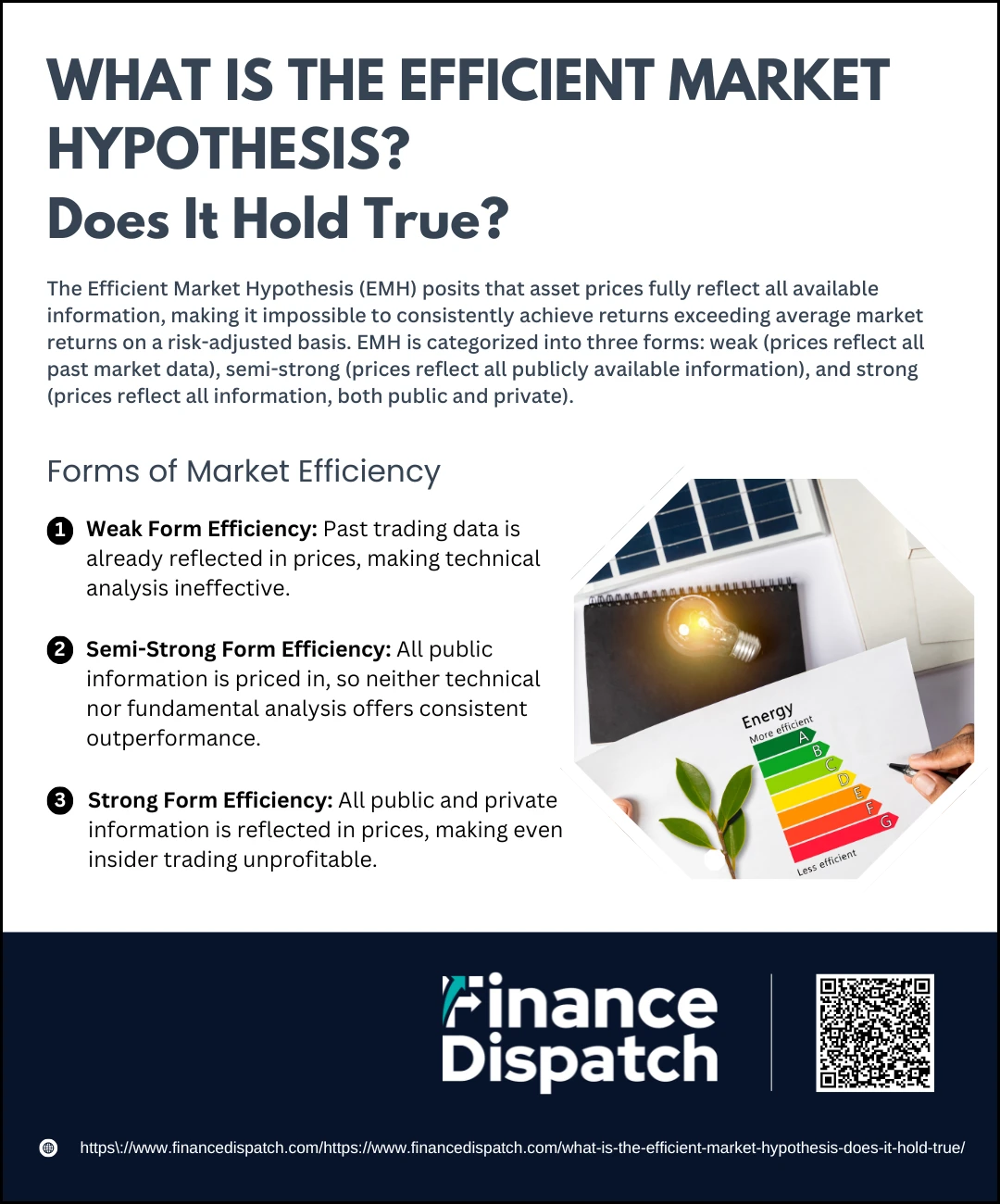 Forms of Market Efficiency
Forms of Market Efficiency
The Efficient Market Hypothesis (EMH) is divided into three distinct forms, each representing a different level of how efficiently market prices reflect information. These forms—weak, semi-strong, and strong—help investors understand the limitations of using past prices, public data, or even insider information to outperform the market.
1. Weak Form Efficiency
This form states that all past trading information—such as stock prices and volume—is already reflected in current market prices. As a result, technical analysis, which relies on historical price patterns, is ineffective in consistently generating excess returns.
2. Semi-Strong Form Efficiency
According to this form, all publicly available information, including financial statements, news releases, and economic indicators, is already incorporated into stock prices. Therefore, neither technical analysis nor fundamental analysis can be used to achieve above-average returns on a consistent basis.
3. Strong Form Efficiency
This most extreme version claims that all information—both public and private (including insider knowledge)—is fully reflected in stock prices. If true, it would mean that not even those with privileged access to confidential company data could consistently outperform the market.
Arguments Supporting EMH
Supporters of the Efficient Market Hypothesis (EMH) believe that financial markets are highly efficient at processing information, making it nearly impossible for any investor to consistently achieve higher returns without taking on more risk. They point to several data-driven and theoretical reasons to justify this position.
1. Outperformance of Passive Funds: Studies consistently show that low-cost index funds often outperform actively managed funds over the long term, aligning with EMH’s claim that beating the market is difficult.
2. Rapid Information Absorption: Markets respond quickly to new public information, leaving little to no opportunity for investors to capitalize on it before prices adjust.
3. Arbitrage and Competition: The presence of arbitrageurs and a large number of market participants ensures that mispricings are quickly corrected, maintaining market efficiency.
4. Random Walk Behavior of Prices: Research shows that stock prices follow a “random walk,” meaning future movements cannot be predicted based on past data, supporting EMH’s core premise.
5. Low Persistence of Active Manager Outperformance: Even top-performing fund managers often fail to maintain their edge consistently, suggesting that their previous success may be due to luck rather than skill.
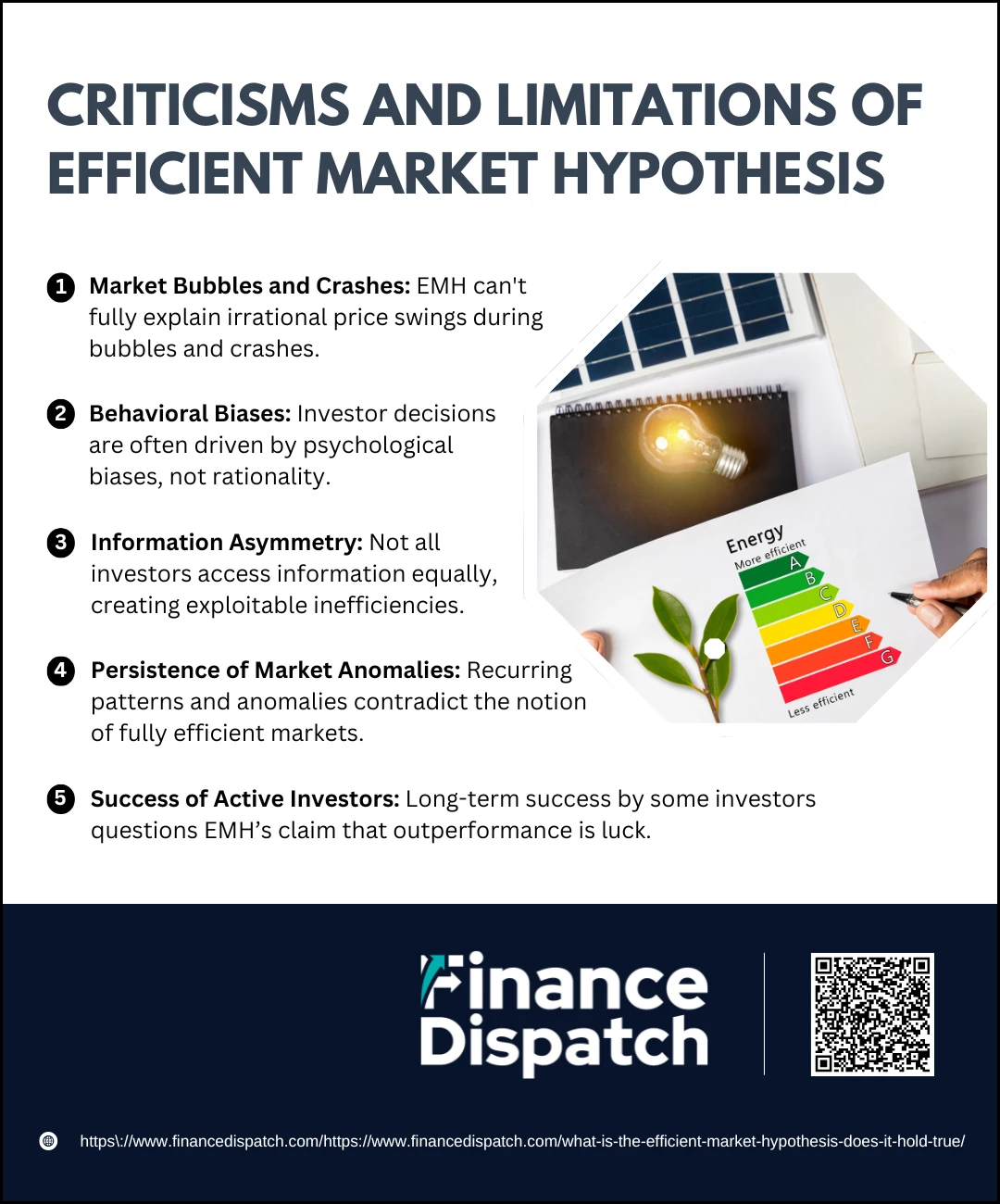 Criticisms and Limitations of EMH
Criticisms and Limitations of EMH
While the Efficient Market Hypothesis (EMH) provides a structured view of how markets operate, many economists, investors, and scholars argue that it oversimplifies the complexities of real-world financial behavior. The theory assumes perfect information, rational decision-making, and instant price adjustments—conditions that are rarely met in practice. As a result, several criticisms and limitations have emerged over time, questioning the full validity of EMH across all market conditions.
1. Market Bubbles and Crashes
EMH struggles to explain why speculative bubbles—such as the housing bubble or the dot-com crash—form and burst. These periods are marked by excessive optimism or fear, driving prices far from fundamental values. According to EMH, such mispricing should be corrected swiftly, yet history shows markets can remain irrational for extended periods.
2. Behavioral Biases
The theory assumes that investors act rationally, but behavioral finance reveals that cognitive biases like overconfidence, loss aversion, and herd behavior frequently influence decisions. These psychological factors lead to misjudgments and errors that cause prices to deviate from their true value.
3. Information Asymmetry
EMH relies on the idea that all investors have equal access to information. In reality, some market participants gain access to news, data, or insights more quickly or more comprehensively than others, allowing them to exploit inefficiencies before prices adjust.
4. Persistence of Market Anomalies
Certain calendar effects (like the January Effect), momentum strategies, and post-earnings announcement drifts consistently challenge EMH. These anomalies imply that it is possible to earn above-average returns by exploiting predictable patterns, even after they become widely known.
5. Success of Active Investors
While EMH suggests that outperforming the market is largely a matter of luck, some investors—such as Warren Buffett, George Soros, and Peter Lynch—have achieved extraordinary, consistent success. Their track records raise questions about whether true skill can, in fact, generate long-term alpha, despite EMH’s assumptions.
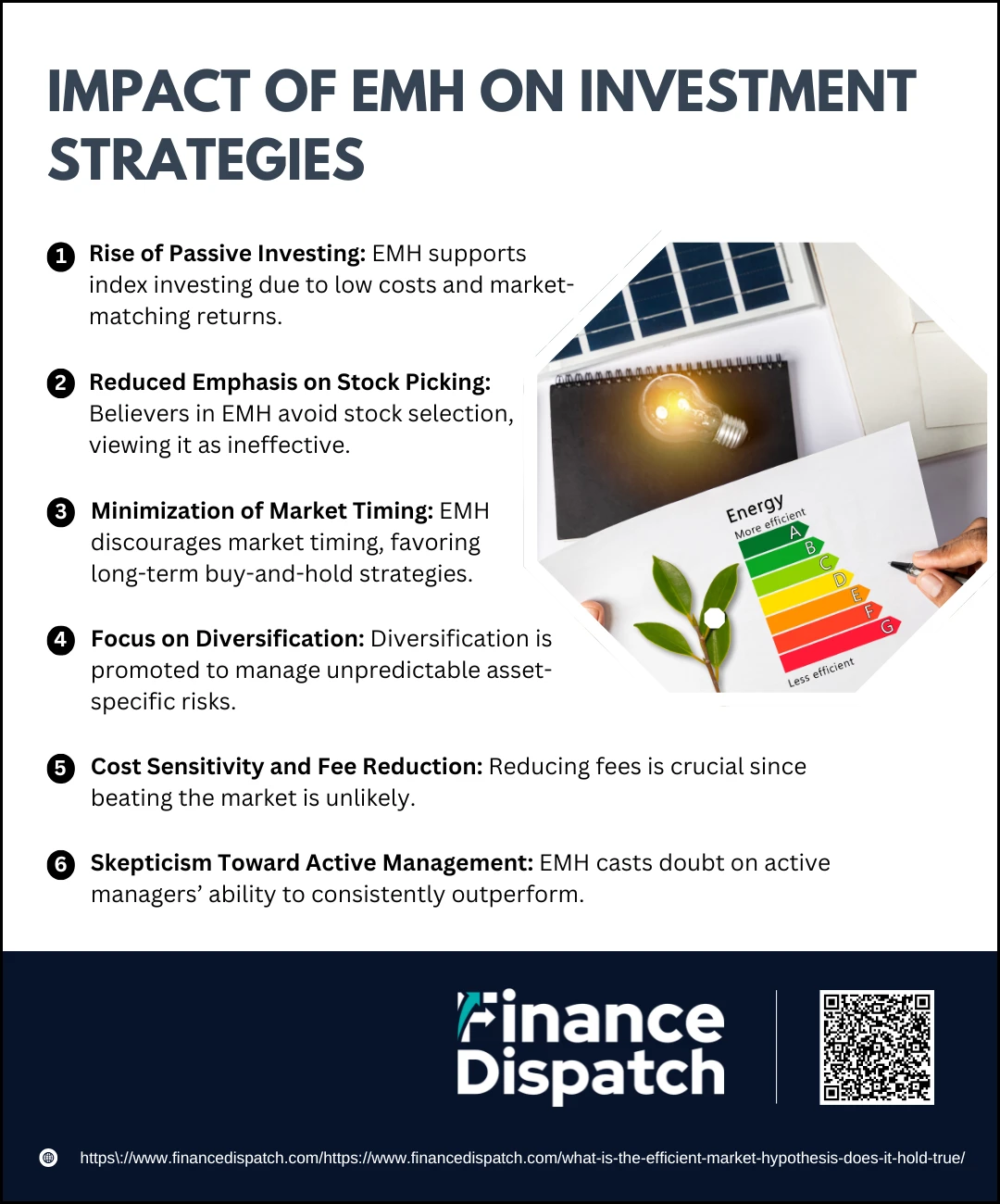 Impact of EMH on Investment Strategies
Impact of EMH on Investment Strategies
The Efficient Market Hypothesis (EMH) has significantly influenced how both individual and institutional investors design their investment strategies. By asserting that all available information is instantly and accurately reflected in asset prices, EMH undermines the traditional belief that investors can consistently “beat the market” through superior analysis or timing. As a result, the theory has shifted investment behavior toward strategies that are more cost-effective, risk-aware, and focused on long-term returns rather than short-term gains.
1. Rise of Passive Investing
EMH has been a major driver behind the popularity of passive investment vehicles like index funds and exchange-traded funds (ETFs). These instruments are designed to replicate the performance of market benchmarks, such as the S&P 500, rather than attempting to outperform them. Since EMH suggests that beating the market is unlikely over time, investors are increasingly choosing passive funds for their low costs and simplicity.
2. Reduced Emphasis on Stock Picking
Traditional investing often relies on analyzing companies to find undervalued or overvalued stocks. EMH challenges this practice, arguing that all relevant information is already factored into current prices. As a result, investors who believe in EMH tend to avoid active stock selection, seeing it as a costly and inefficient way to try to gain an edge.
3. Minimization of Market Timing
Many investors attempt to move in and out of markets based on predictions of economic trends or market shifts. EMH, however, posits that such predictions are rarely accurate or reliable because future price movements are unpredictable. Consequently, EMH promotes a “buy-and-hold” strategy over frequent trading, emphasizing consistency and long-term participation.
4. Focus on Diversification
Since EMH holds that individual stock returns cannot be reliably predicted, diversifying across sectors, geographies, and asset classes becomes a key method to manage risk. A diversified portfolio reduces the impact of poor performance in any single asset and aligns with EMH’s recommendation to maximize return for a given level of risk.
5. Cost Sensitivity and Fee Reduction
If markets are efficient and excess returns are hard to achieve, then minimizing costs becomes essential. EMH leads investors to prefer low-expense ratio funds and platforms that reduce transaction fees, as unnecessary costs can erode returns over time—especially when outperformance is not expected.
6. Skepticism Toward Active Management
EMH casts doubt on the ability of fund managers to consistently outperform the market. Numerous studies show that many actively managed funds fail to beat their benchmarks after fees. This reinforces the EMH-based argument that investors may be better served by lower-cost, passively managed options rather than paying for expensive active management that may not deliver better outcomes.
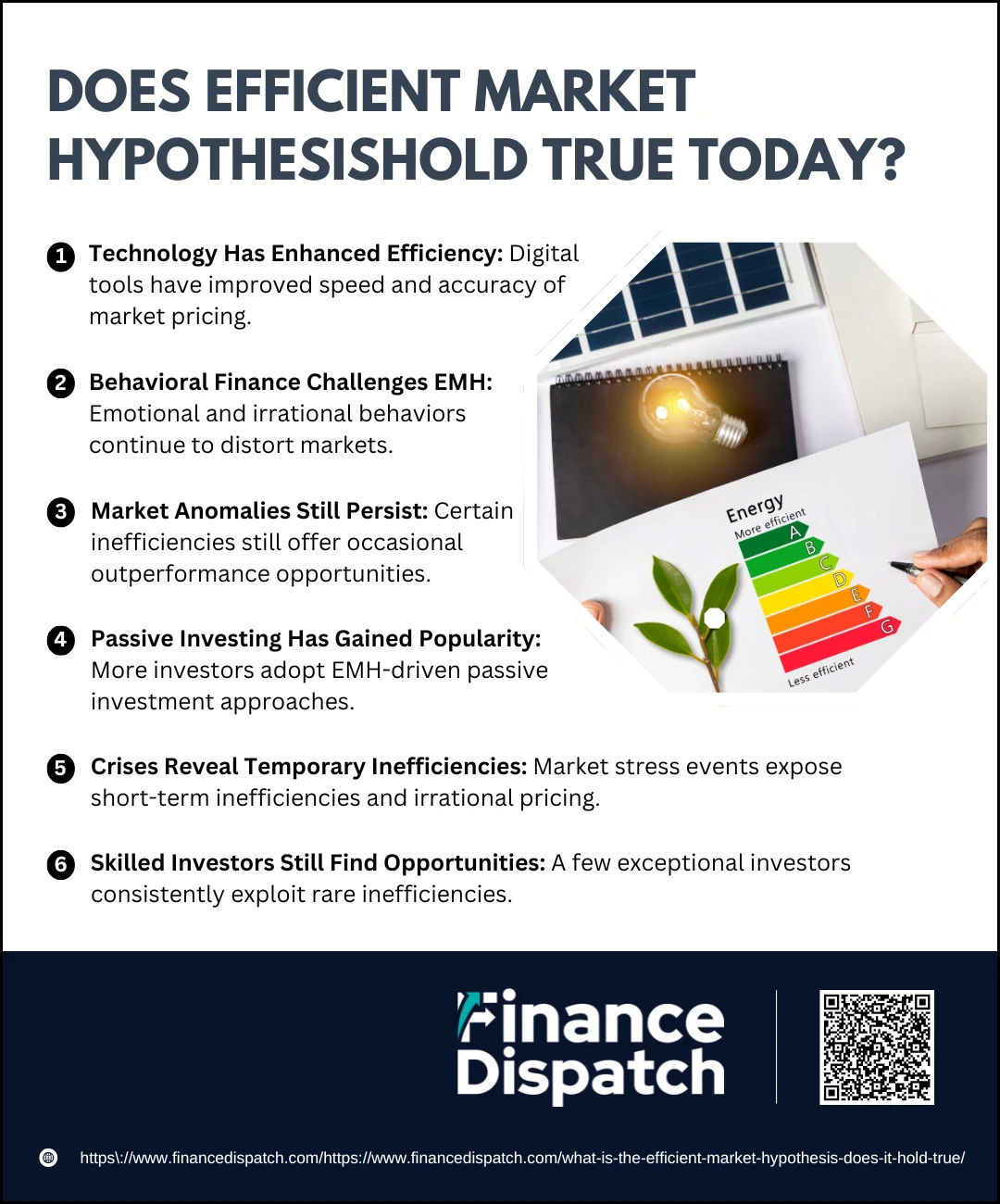 Does EMH Hold True Today?
Does EMH Hold True Today?
The relevance of the Efficient Market Hypothesis (EMH) in today’s financial world remains a subject of ongoing debate. While technological advances and increased transparency have improved market efficiency, critics argue that behavioral biases, crises, and anomalies continue to challenge the theory. In practice, the truth may lie somewhere between full efficiency and persistent inefficiencies.
1. Technology Has Enhanced Efficiency
With the rise of algorithmic trading, real-time data access, and automated platforms, markets today are faster and more efficient than ever in absorbing and responding to new information.
2. Behavioral Finance Challenges EMH
Despite improved access to information, human behavior still influences the market. Emotional decision-making, overconfidence, and herd behavior often lead to mispricings that EMH cannot fully account for.
3. Market Anomalies Still Persist
Patterns like the momentum effect, value premium, and calendar anomalies continue to be observed, suggesting that opportunities to outperform the market occasionally exist.
4. Passive Investing Has Gained Ppularity
The surge in passive investing reflects growing acceptance of EMH principles, as more investors aim to match market returns instead of trying to beat them.
5. Crises Reveal Temporary Inefficiencies
During periods of extreme stress—such as the 2008 financial crisis or the COVID-19 market crash—asset prices often swing wildly, reflecting panic and uncertainty rather than rational pricing.
6. Skilled Investors Still Find Opportunities
While rare, some investors and fund managers have demonstrated the ability to outperform the market over the long term, suggesting that market inefficiencies, though limited, can be exploited by those with exceptional skill or insight.
Conclusion
The Efficient Market Hypothesis has played a foundational role in shaping modern financial theory and investment practices. By asserting that markets quickly and accurately reflect all available information, EMH has guided a shift toward passive investing, diversification, and cost-conscious strategies. However, real-world events—such as market bubbles, financial crises, and the success of certain active investors—demonstrate that markets are not always perfectly efficient. While EMH offers valuable insights into how information flows through financial systems, its limitations suggest that a balanced approach, one that acknowledges both efficiency and occasional irrationality, may better reflect the complexities of today’s global markets.



